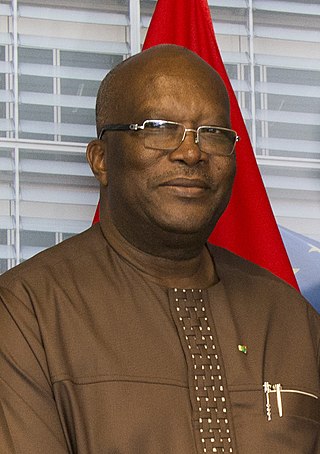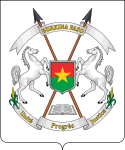
Burkina Faso is a landlocked country in West Africa with an area of 274,200 km2 (105,900 sq mi), bordered by Mali to the northwest, Niger to the northeast, Benin to the southeast, Togo and Ghana to the south, and the Ivory Coast to the southwest. As of 2021, the country had an estimated population of 20,321,378. Previously called Republic of Upper Volta (1958–1984), it was renamed Burkina Faso by President Thomas Sankara. Its citizens are known as Burkinabès, and its capital and largest city is Ouagadougou.

The Politics of Burkina Faso takes place in a framework of a semi-presidential republic, whereby the Prime Minister of Burkina Faso is the head of government, and of a multi-party system. The President of Burkina Faso is the head of state. Executive power is exercised by both the President and the Government. Legislative power is vested in both the government and parliament. The party system was dominated by the Congress for Democracy and Progress (CDP) until the 2014 Burkinabé uprising. Since then, the CDP has lost influence. The Judiciary is independent of the executive and the legislature. The Economist Intelligence Unit rated Burkina Faso an "authoritarian regime" in 2022.

The history of Burkina Faso includes the history of various kingdoms within the country, such as the Mossi kingdoms, as well as the later French colonisation of the territory and its independence as the Republic of Upper Volta in 1960.

Blaise Compaoré is a Burkinabé-Ivorian former politician who served as the second president of Burkina Faso from 1987 to 2014. He was a close associate of the first president, Thomas Sankara, during the 1980s, and in October 1987, he led a coup d'état during which Sankara was killed. Subsequently, he introduced a policy of 'rectification', overturning the leftist and Third Worldist policies pursued by Sankara. He won elections in 1991, 1998, 2005 and 2010, in what were considered unfair circumstances. His attempt to amend the constitution to extend his 27-year term caused the 2014 Burkinabé uprising. On 31 October 2014, Compaoré resigned, whereupon he fled to the Ivory Coast.

The regions of Burkina Faso are divided into 45 administrative provinces. These 45 provinces are currently sub-divided into 351 departments or communes.

Burkina Faso elects on the national level a head of state – the president – and a legislature. The president is elected for a five-year term by the people. The National Assembly has 127 members, elected for a five-year term by proportional representation. Burkina Faso has held democratic elections since 1965. The history of elections has been slightly inconsistent, with the government dynamically changing at the hands of various coups, constitutional changes, and boycotts from various political parties. In 2015, the country experienced its first peaceful and fair election ever. Corruption plagued Burkina Faso's presidential elections for 50 years, but following a coup overthrowing Blaise Compaoré, the nation has seen more democratic and less corrupt electoral processes. Terrorism has played a substantial role in Burkina Faso's elections, with candidates running on the promise to keep the nation safe from the rise of Islamic jihadism they experienced in the 2010s. Historically, a few different parties have held power in Burkina. The Organization for Popular Democracy – Labour Movement was former president Compaoré's party affiliation, and thus they held power from 1987 to 2014. His party took power through a coup, and in 2014 also lost their control when the Regiment of Presidential Security overthrew the government.

Roch Marc Christian Kaboré is a Burkinabé banker and politician who served as the President of Burkina Faso from 2015 until he was deposed in 2022. He was the Prime Minister of Burkina Faso between 1994 and 1996 and President of the National Assembly of Burkina Faso from 2002 to 2012. Kaboré was also president of the Congress for Democracy and Progress (CDP) until his departure from the party in 2014. He founded the People's Movement for Progress party that same year.

The unicameral National Assembly is Burkina Faso's legislative body. In 1995, it became the lower house of a bicameral Parliament, but the upper house was abolished in 2002. The upper house was to have been restored under the name "Senate" in the June 2012 constitutional amendments. This revision was never executed due to an extended and unresolved political confrontation over the Senate's establishment, which left the country effectively with a unicameral legislature as of the October 2014 constitutional crisis.
Solenzo is a city located in the province of Banwa in Burkina Faso. It is the capital of Banwa Province. Bénéwendé Stanislas Sankara held his campaign's first official rally before the 2015 general election in Solenzo on November 8, 2015.
Articles related to Burkina Faso include:

The following outline is provided as an overview of and topical guide to Burkina Faso:
Yokouma is a village in the Zabré Department of Boulgou Province in south-eastern Burkina Faso. As of 2005, the village has a population of 139.

General elections were held in Burkina Faso on 29 November 2015. The elections were the first national elections in the country since the 2014 Burkinabé uprising and the departure of President Blaise Compaoré, who had ruled Burkina Faso for 27 years. The party of former President Compaoré, the Congress for Democracy and Progress, was banned from presenting a presidential candidate in the presidential elections but was still able to participate in the parliamentary election.

The 2014 Burkina Faso uprising was a series of demonstrations and riots in Burkina Faso in October 2014 that quickly spread to multiple cities. They began in response to attempts at changing the constitution to allow President Blaise Compaoré to run again and extend his 27 years in office. Pressure for political change came from civil society and in particular from the country's youth. Following a tumultuous day on 30 October, which included the involvement of former Defence Minister Kouamé Lougué and the burning of the National Assembly and other government buildings as well as the ruling Congress for Democracy and Progress party's headquarters, Compaoré dissolved the government and declared a state of emergency before eventually fleeing to Côte d'Ivoire with the support of President Alassane Ouattara.

The Greens of Burkina is a political party in Burkina Faso.

The 2015 Burkina Faso coup d'état attempt was a failed coup d'état launched on 16 September 2015 in Burkina Faso, when members of the Regiment of Presidential Security (RSP) – a controversial autonomous military unit, formed under President Blaise Compaoré – detained the country's government. Among those detained were the transitional President Michel Kafando, Prime Minister Yacouba Isaac Zida, and numerous members of the cabinet. This transitional government was formed in the wake of the 2014 Burkinabé uprising, when a popular movement overthrew the long-time president Compaoré, who himself had come to power in a 1987 coup against the left-wing leader Thomas Sankara. New general elections were planned for 11 October 2015.

General elections were held in Burkina Faso on 22 November 2020 to elect the President and National Assembly. In the presidential elections, incumbent president Roch Marc Christian Kaboré of the People's Movement for Progress was re-elected in the first round with 57.7% of the vote, avoiding the need for second round. The main campaign focus of the major presidential candidates was the growing insecurity in the country with the rise in terrorism and ethnic violence.

A coup d'état was launched in Burkina Faso on 23 January 2022. Gunfire erupted in front of the presidential residence in the Burkinabé capital Ouagadougou and several military barracks around the city. Soldiers were reported to have seized control of the military base in the capital. However, the government denied there was an ongoing coup in the country. Several hours later, President Roch Marc Christian Kaboré was reported to have been detained by the soldiers at the military camp in the capital. On 24 January, the military announced on television that Kaboré had been deposed from his position as president. After the announcement, the military declared that the parliament, government and constitution had been dissolved. The coup d'état was led by military officer Paul-Henri Sandaogo Damiba.

Ibrahim Traoré is a Burkinabé military officer who has been the interim leader of Burkina Faso since the 30 September 2022 coup d'état which ousted interim president Paul-Henri Sandaogo Damiba. At age 34, Traoré is the world's youngest currently serving state leader.









